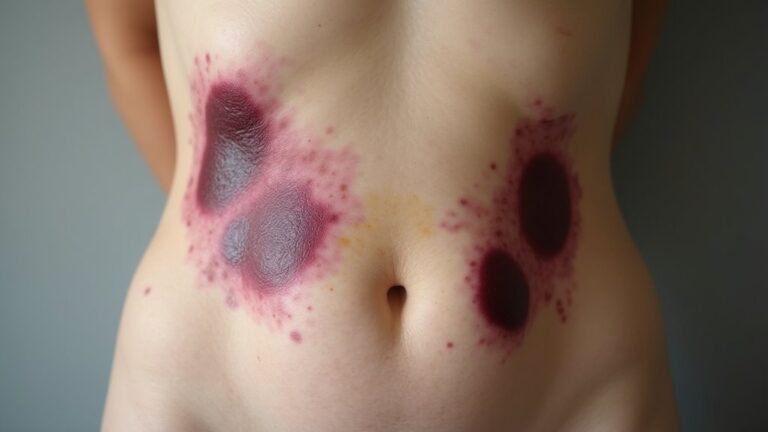Envision you’re in a public setting, savoring a meal with companions, and all at once your stomach begins to churn—a not-so-pleasant signal that your body’s not at its best. Handling diarrhea in public can be uncomfortable, but it doesn’t have to be a complete disaster. It’s all about how you manage the scenario. You’ve got choices, and with a few subtle tactics at your disposal, you’ll maneuver this awkward situation like an expert. Prepared to learn some practical advice?
Stay Calm and Locate the Restroom
Whenever nature calls, particularly in public, you might experience a wave of panic washing over you. Keeping calm is key, especially should you suddenly face urgency from symptoms like diarrhea. Stress can trigger your digestive system, making your situation feel even more intense.
Begin with scanning for restroom signs—most public venues display them every 100-200 feet to assist you in finding accessible restrooms quickly. Should you require privacy, aim for single-stall options, which tend to be less crowded.
Don’t hesitate to ask staff for assistance in case you’re struggling to locate one. Keep in mind, you typically have just 5-30 seconds to reach a toilet, so act fast and breathe steadily to manage your anxiety.
Carry Essential Emergency Supplies
Having an emergency kit ready can make all the difference in case you’re caught off guard due to diarrhea in a public setting.
Pack travel-sized wet wipes, which are essential for quick cleanups. Don’t forget plastic bags for any soiled clothes and spare underwear—these are lifesavers should you need a change.
Small, resealable disposal bags for used hygiene products also help maintain cleanliness and respect your privacy in public restrooms. Consider adding a few more hygiene products to your kit, just in case.
This discreet emergency kit allows you to feel more secure about sudden situations, letting you focus on finding the nearest restroom instead of worrying about unexpected messes. Preparedness truly enhances your confidence while handling such sensitive moments!
Maintain Hygiene With Proper Techniques
At the time you’re handling diarrhea in public, maintaining hygiene is crucial for your comfort and health.
Follow these steps to guarantee you’re clean and protected:
- Wash your hands with soap for at least 20 seconds after using the toilet, especially in public restrooms. Use warm water when available.
- When soap and water aren’t an option, rely on hand sanitizer containing at least 60% alcohol.
- Carry disinfectant wipes to clean toilet seats or surfaces before you sit down.
- Dispose of used tissues or hygiene products in sealed bins to prevent contamination.
Use Discreet Clothing Choices
At times you’re out and about, the last thing you want to worry about is a sudden bout of diarrhea. Selecting discreet clothing can make a substantial difference. Pick dark-colored pants or patterned fabrics to hide any possible stains. Loose-fitting attire not only lessens discomfort but also aids with digestive noise. Layer with long shirts or jackets to offer a safety net against leaks. Keeping spare underwear in a discreet pouch can guarantee swift alterations if necessary. Think about utilizing stain-resistant fabrics to further diminish visibility in case of accidents. While you move through food sources and symptoms causing unease, these wardrobe selections can be your allies during unforeseen bowel movements.
| Clothing Type | Advantages | Best Use Case |
|---|---|---|
| Dark-colored pants | Conceals stains effectively | Casual outings |
| Loose-fitting clothing | Reduces discomfort and noise | Long events |
| Long shirts/jackets | Covers accidental leaks | During meals |
| Spare underwear | Quick changes in emergencies | On-the-go |
| Stain-resistant fabrics | Minimizes visibility of minor accidents | Daily wear |
Minimize Discomfort During an Episode
At the time you’re experiencing diarrhea, feeling comfortable can be a real challenge, particularly in public. To minimize discomfort, try these tips:
- Focus on slow, deep breathing to relax your abdominal muscles and reduce cramping during episodes.
- While seated on the toilet, lean slightly forward to improve your bowel movement efficiency, minimizing straining.
- Apply gentle pressure to your lower abdomen with your hands to help ease discomfort.
- Avoid caffeine and sugary foods before heading out, as they can exacerbate your symptoms.
Keeping tissues or wet wipes handy is essential in case public restrooms lack adequate supplies.
Through preparing and following these strategies, you can help yourself feel a bit more at ease during uncomfortable moments.
Stay Hydrated and Follow Dietary Adjustments
At times you’re handling diarrhea, staying hydrated is key to feeling better.
Drinking plenty of water and sticking to a bland diet, like the BRAT diet, can help ease your symptoms and keep your body balanced.
Avoiding certain foods can make a big difference, so pay attention to what you eat as you recover.
Drink Plenty of Water
Staying hydrated is essential while you’re managing diarrhea, particularly if you’re out and about. You want to replace fluids lost to avoid dehydration.
Here are some simple tips to keep in mind:
- Drink small sips of water throughout the day.
- Consider oral rehydration solutions for severe fluid loss; they contain electrolytes like sodium and potassium.
- Avoid caffeinated, sugary, or carbonated drinks; they can irritate your digestive tract.
- Consume clear broths or diluted fruit juices without pulp to help replenish electrolytes.
The World Health Organization suggests aiming for 2.5–3.5 liters of fluids daily during diarrhea.
Keep in mind, staying hydrated not only helps you feel better but also aids in getting your digestive tract back on track!
Follow a Bland Diet
Moving through diarrhea in public can feel overwhelming, especially should your stomach is upset. To help ease digestion, try following the BRAT diet—bananas, rice, applesauce, and toast. These bland, low-fiber foods can provide some relief.
You can also munch on plain crackers or boiled potatoes. Keep in mind to avoid dairy and spicy foods, as they can irritate your system and prolong discomfort. Instead of three big meals, go for small, frequent meals to reduce strain on your stomach.
Once you’re feeling better, slowly reintroduce normal foods like plain yogurt or chicken. Staying mindful of your diet will support your recovery and help you feel more comfortable as you move through your day.
Know When to Seek Medical Help
Diarrhea can strike unexpectedly, leaving you feeling vulnerable, especially in a public setting. Recognizing the right moment to seek medical help is vital. Keep an eye out for these signs:
- Should severe diarrhea persist beyond 48 hours for adults or 24 hours for children, it’s time to consult a doctor.
- Notice black, bloody, or pus-filled stools? This could indicate a serious infection or internal bleeding—get medical attention immediately.
- Experiencing dehydration symptoms like dizziness or dry mouth? Visit a healthcare provider right away.
- A high fever (above 101.5°F for adults) accompanying diarrhea could signal a bacterial infection; seek emergency care.
Being aware of these symptoms guarantees you get the help you need while managing your discomfort.




